
ROBERTA GELLIS
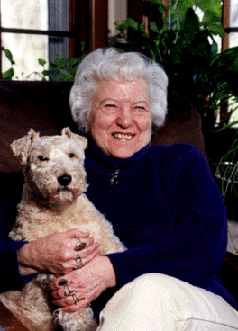 |
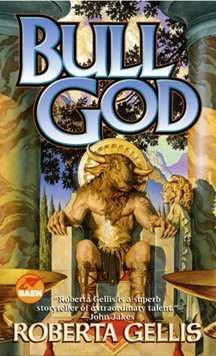

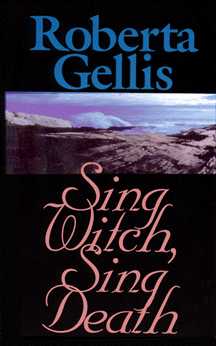
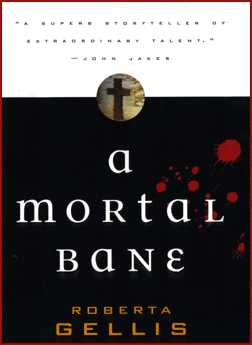
As you most of you are aware, I have admired Ms. Gellis� work for most of my adult life. When I was recently given the opportunity of visiting with her in her home, I jumped at the chance. I also have to admit here that the interview was in progress before I visited her and was done via email. She graciously consented to this interview and I think you will enjoy it.

Sharyn: Your bio at your web site shows that you have educational and career paths that are very diverse: a Master's Degree in Biochemistry and another in Medieval Literature, research chemist, freelance editor of scientific manuscripts, and author of 36 books covering several genres, including historicals (Medieval and Regency), science fiction under the name of Max Daniels, and in more recent years, fantasy in the form of Greek mythology. In addition to all this, you have been wife to your husband Charles for 50 plus years now, mother to Mark and grandmother to Elizabeth. Is there anything in your life that you wanted to do and didn't or couldn't accomplish?
Roberta: Lord bless me, of course there are. I'm sorry I didn't go to medical school; I think I would have made a good doctor. I always wanted to study archeology and paleontology and never had the time. No one lives without looking at the grass on the other side of the fence of his or her life and deciding that grass is greener. One thing I never wanted, however, is to write The Great American Novel in which disgusting people do stupid things for revolting reasons and all end up dead or miserable forever. I love what I write and it's the kind of thing I like to read.
Sharyn: Was there a progression or connection that led from one to the other?
Roberta: Not really. You've no doubt heard of multiple personality syndrome; I don't have that but I seem to have a multiple interest syndrome. One interest doesn't grow out of another but seems to spring full-formed into my head as Athena sprang full formed (and, I believe wearing all her armor) from her father's head - I do hope that was a metaphor for her development or else he would have had the be-all and end-all of headaches. Anyway, sometimes there is a serendipitous meeting, as when I find a scientific idea that would make a good sci-fi book or a good murder weapon, but otherwise the interests don't connect. I find science fascinating and to the best of my ability keep up with what is going on in the scientific world. Not that I am really up on the new technologies - about the best I can do is read SCIENCE NEWS every week. I find history equally fascinating, particularly the people that made and lived in history.
Sharyn: What was your undergraduate degree in?
Roberta: My undergraduate degree was in Chemistry, but I managed to squeeze in nearly a full major in English Lit (I only lacked a history of the language course to make it a full major).
Sharyn: I was very surprised to learn of your scientific background - you know, right brain/left brain; Art/Science aren't typically predominant in the same person. Do you feel they are opposites also, or do they seem a natural combination to you? Why?
Roberta: I guess I never thought about them being opposites. To me any information is grist to the mill of an "Elephant's Child" kind of brain. ("The Elephant's Child" is one of the JUST SO stories by Rudyard Kipling; it tells of a creature that had an insatiable curiosity and kept sticking its nose into things until the nose got pulled out into a long trunk. A most delightful story; all the JUST SO stories are delightful.) I guess I'm just a nosy person and I like to know things. It doesn't matter to me whether the thing is a scientific fact or a beautiful story. It's all VERY INTERESTING.
Sharyn: Did you give up research chemistry in order to devote yourself to writing?
Roberta: No. Actually I gave up research chemistry because my feet hurt. One stands all day at a laboratory bench. There were also changes taking place in the place where I worked that I didn't like. What with one thing and another, I ended up leaving to work for McGraw Hill as a scientific editorial assistant. I had by then finished my Master's in biochemistry and realized I wouldn't be able to go farther without intensive tutoring in math. But I was in the habit of going to school, so I decided to audit a couple of classes in medieval literature. There I met the friend who suggested that I apply for a teaching assistantship. I began on another master's degree, completed that, and went on to finish all the graduate work for a Ph.D. degree. When I was faced with spending three to five years researching and writing a dissertation and doing a lot more studying, I suddenly asked myself why I wanted a Ph.D. I had no intention of teaching, and what else can you do with an advanced degree in medieval literature? I was also very pregnant by then, so I quit to have Mark. He was a good baby, but he WAS a baby. In the need for intellectual stimulation, I began my first book. It got rejected twice. Then I found an agent - and I was off.
Sharyn: I think I remember reading at one time you had a hobby of dressing dolls in medieval clothing. Is this still a hobby or yours and what other activities do you do to relax and unwind? (Sharyn�s note: Well, ladies, this was a faux pas on my part, but since she was gracious enough to answer it, I let it stand. Of course it�s not the first faux pas and CERTAINLY, knowing me, won�t be the last!)
Roberta: Sorry, that wasn't me. I never cared for dolls. A fan sent me two beautiful dolls, representations of Alinor and Ian. I still have them, but they aren't my work. I don't really have any hobbies, except reading. To unwind, I read. If I am really uptight, I read Jane Austen. Her delicious prose, sly and delightful humor, and interesting without generating tension stories are very calming. There are a few sf/f authors that have the same effect on me.
Sharyn: Some authors write a general outline of their books, flesh out their characters' personalities, and then write the book accordingly. Others start with an idea and just start writing and let their characters develop as they go along. Do any of your characters change before your eyes as far as personality, etc? What is your creative process?
Roberta: My books often start with the protagonist; that is, a character comes alive to me, often in some characteristic pose or scene. The character is almost invariably suitable to one of the periods in which I write and I generally then research the historical events that a character of that personality would be likely to be involved in. The plot then begins to develop as I imagine the character woven into the history. When I wrote historical romances, my outline was sketchy because I had the history to lean on, and that was really the plot. Now that I am writing mysteries, the outline is much more detailed and developed because I need to know what everyone is doing so I can drop clues and suchlike. My characters do develop very strong personalities and often will not do what the plot wants them to do. If so, I just toss out the plot and let the characters have their own way. After all, they are living the events; I am only recording them.
Sharyn: One of the reasons why I, personally, enjoy your books so enormously is that they are always very meticulously researched and historically correct. I readily admit that this is my major pet peeve with historical writers; not particularly dialect, but historical facts. Do you have someone who assists you or do you do it yourself? Does your editor/publisher verify things like that or is that strictly your responsibility? And what percentage of your time on any given book is spent in research?
Roberta: I do my own research. In fact, I like the research better than the writing - although I love to write too. (Remember "The Elephant's Child?" I adore finding out things.) Having someone else look things up is like having someone else suck eggs for you. You don't get shell in your mouth, but you don't get any egg either. The editor is invariably far, far more ignorant than I am, at least about medieval history, manners and customs (and usually about 40-50 years younger) and would not be of the smallest help in verifying anything; however, copy editors are of great help in checking spelling and consistency (neither of which I'm too good about). How much time I spend on research depends a lot on how often I forget what I'm looking up and just begin to read the book I was using as a reference. Since I have been working in the medieval period for about 40 years, I am very familiar with it. What I look up now are very specific things, although I find it doesn't hurt to refresh my memory about this and that as I go along.
Sharyn: With the obvious exception of your new books, the bulk of your books are no longer available as newly published and only rarely available in used book stores (I know that for fact because I'm always searching to replace my worn out copies); are there any plans for doing reprints of any of them?
Roberta: I wish there were. My agent has been trying to sell my books for reprint, but I am running into the same problems with reprint as with any new historical I write. Publishers (or editors for publishers) say my books are too long, too complicated, and too history-driven. The contemporary taste seems to be for romance-driven plots and, though I like a good love story very well, I cannot believe in people who only think "does s/he love me or does s/he not" while the world is falling apart around them.
Sharyn: I believe THE SWORD AND THE SWAN is the story of Alinor's grandparents. I am curious about why you never wrote the story of Adam, Alinor's father, and also, what was Alinor's mother's name. I don't remember ever having read her mother's name.
Roberta: Well, Rannulf and Catherine are not really Alinor's grandparents. If you look at the dates of their marriage and Alinor's age at the date of ROSELYNDE, you will realize that they could not be the parents of the girl (I never gave her a name, but we can assume it would be Catherine like her mother) who married Adam of Roselynde and had one daughter, before they were drowned returning from Ireland. I didn't write the story of Adam because he lived during the reign of Henry II. In BOND OF BLOOD, KNIGHT'S HONOR, and THE SWORD AND THE SWAN I presented characters who supported Henry. Whether they had blinded themselves to what Henry really was, or whether he changed after taking the throne (a little of both, I think), many of those supporters became rebels during his reign. It just seemed to complicated to me to have to deal with explaining those changes, which were largely political and based on different interpretations of fealty. I just skipped the whole reign to a time when all the characters in the first three books would be dead and started afresh.
Sharyn: In recent years you have written books based on Greek mythology. Did you simply tire of the medieval period or was this something you'd always wanted to do?
Roberta: I've never tired of the medieval period; it was a time of infinite variety and rapid social and political development, but I also wanted to do the mythological fantasy. I started with Hades and Persephone because I was terribly offended by what the Victorians had done to Persephone. My mother was a Greek and Latin major in college, and she told me the myths (straight out of Greek sources) when I was a little girl because she didn't know any "fairy tales" to tell me (and because in those days no one worried about giving a child trauma by telling horrible stories - just read the Grimm fairy tales). Persephone was a goddess of infinite power; she was so awesome to the Greeks that they worshiped her under different names. I was horrified when Persephone was presented as a little girl who wanted her mommy - I suppose because Victorians felt that it was improper for a woman to accept and enjoy abduction. The other stories came because they interested me and I wanted to flesh out the characters. Why, for example, did Orpheus love Eurydice so much that he was willing to follow her to the Underworld and bargain for her release? There isn't anything in the myth that explains that. And, no, I wasn't tired of the medieval period. The style in historical romance had already changed and no one would publish the kind of historical romance that I wrote, so I thought I'd try paranormal romance. Unfortunately the ancient Greek setting was not popular with romance readers, and the books did not sell well. My new one, BULL GOD, which is much like DAZZLING BRIGHTNESS, SHIMMERING SPLENDOR, and ENCHANTED FIRE in style, is being published by a science fiction publisher and I hope will find a more appreciative audience.
Sharyn: Your most recently published book, A MORTAL BANE, is a medieval whodunit with only a slight romantic sub-plot. I believe you once told me that you were going to do a sequel to A MORTAL BANE. Has the sequel been written yet? And if so, does the budding attraction hinted at in A MORTAL BANE, between Magdalene and Sir Bellamey, heat up?
Roberta: The book just handed in to Forge (my publisher), A PERSONAL DEVIL, is a sequel to A MORTAL BANE in that Magdalene and Bell are again the detectives and it takes place a few weeks after A MORTAL BANE. The romance plot continues; I don't know whether you could say it heats up. The situation remains the same: Magdalene will not give up her profession and Bell wants her to be his woman only. They do end up in bed at the very end of A PERSONAL DEVIL, but their problems are by no means over. I am currently working on a proposal for a third book in the series (BONE OF CONTENTION), in which Magdalene goes to Oxford to help out William of Ypres and Bell, who is also sent to Oxford, has to deal with his jealousy.
Sharyn: Was there any one book that you found difficult to write? If so, why? And was there one which you found most enjoyable?
Roberta: I cannot say one book is more difficult than another. They all have parts that I must slog through and write and rewrite and re-rewrite because something just won't come right, but every book has its bad parts and parts where the writing just flows. The essential thing is to get the whole thing smooth enough so that no reader knows which parts just wrote themselves and which I slaved over.
Sharyn: Here's a question I'm told most authors hate, but I am going to ask you anyway! Do you have a favorite book out of the many that you have written, and, if so, why is it your favorite?
Roberta: It's an easy question to answer. I don't have a favorite. I like each book best while I'm writing it (or hate it most - depending on how the writing is going). Alinor is my favorite character, but Persephone is a close second.
Sharyn: Unfortunately, I have never read any of your science fiction work under the name of Max Daniels because, until recently, I wasn't aware that you had written science fiction - and I have been unable to find them. How many did you write? Were they romantic sci-fi?
Roberta: I have written two "soft" science fiction books - "soft" because they do not adhere strictly to scientific principles. The titles are STAR GUARDIAN and OFFWORLD (both chosen by the publisher). Neither book is romantic in the sense that the characters never wonder does s/he love me or does s/he not, but you might consider them romantic because, in each case, the protagonist finds a partner to share his/her life.
Sharyn: You have a new book being released in May of this year titled BULL GOD. Would you tell us a bit about it? You mentioned that you have proposals for three more new books in the works. Can you give us some hints about these, too?
Roberta: BULL GOD will be released in May. It is the story of the Minotaur - a monster with the head of a bull and the body of a man born of his mother's illicit union with Poseidon in the form of a bull - told from the point of view of Ariadne and her lover, the god Dionysus. Ariadne was only thirteen years old when she was consecrated as the high priestess of Dionysus' worship in Crete. She found the god all too real when he answered her call, and fell in love with him because of his kindness to her. But time moved very slowly for Olympians, and Dionysos never seemed to realize that Ariadne was growing up. Nor was she able to give her full mind to waking Dionysus to the change in their relationship that she desired, because the Minotaur had been born. Ariadne was the only person with the courage and the softness of heart to attend to the strange creature, even to defend him when Dionysus said that, in mercy to the poor malformed baby and the people of Crete upon whom he would bring grief and disaster, the Minotaur must die. As to the other three books: THRICE BOUND, the story of Hekate, has been accepted by Baen and will be written between now and the end of September. Hekate is the most mysterious of the Greek goddesses, and this book will describe how and why she came from the unknown city of Ur to Olympus. BONE OF CONTENTION will be the third book in the Magdalene and Bell series. It will be set in Oxford rather than London during the King's Council, and many of the characters will be new, Magdalene's women having stayed at the Old Priory Guesthouse. SERPENT'S POISON might be the beginning of a new series. The protagonist will be Lucrezia (the Renaissance Italian spelling) Borgia, whom most biographers have concluded was a gentle, religious, and intelligent woman who never poisoned anyone and has been blackened by association with her father and brother. Lucrezia married Alfonso of Ferrara, partly because she was ordered to do so by her father, and partly because she wanted to get away from Rome where her reputation had been damaged. In my story, one of her ladies-in-waiting is poisoned soon after the wedding and Lucrezia feels she must find out who the real murderer was before the crime is laid at her feet.
Sharyn: One last question: With all that you have accomplished, to paraphrase Ian in Sybelle, "When did you have time to eat and sleep?"
Roberta: I'm not sure I have an answer to that question,
but one part of it is - by staying up until 2 or 3 a.m. Actually, I find I have enough time
for my work, and eating and sleeping are necessary to maintain my marriage (which has been
maintained for 53 years, so eating and sleeping are regular enough). What might get
skimped, if I were not fortunate enough to be one of those people who doesn't need more than
five or six hours of sleep, would have been my reading. As it is, I have no problem. I
begin to read after I do the dishes and continue until about 2 (unless it's a particularly
gripping book, in which case I can easily be up much later).

I want to thank you, Roberta, for taking the time out of your busy schedule to do this interview for me and the ladies at RBL Romantica. Thank you, too, for your work and for your gracious hospitality.
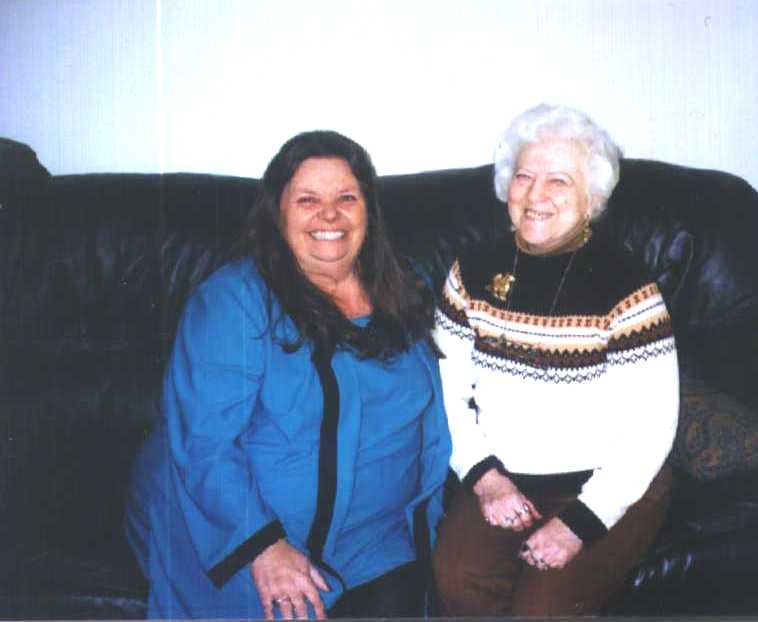
Roberta's Website
Index of Author Interviews.
Copyright � RBL Romantica! 2000
All rights reserved.
Reproducing material from this site without permission is prohibited.